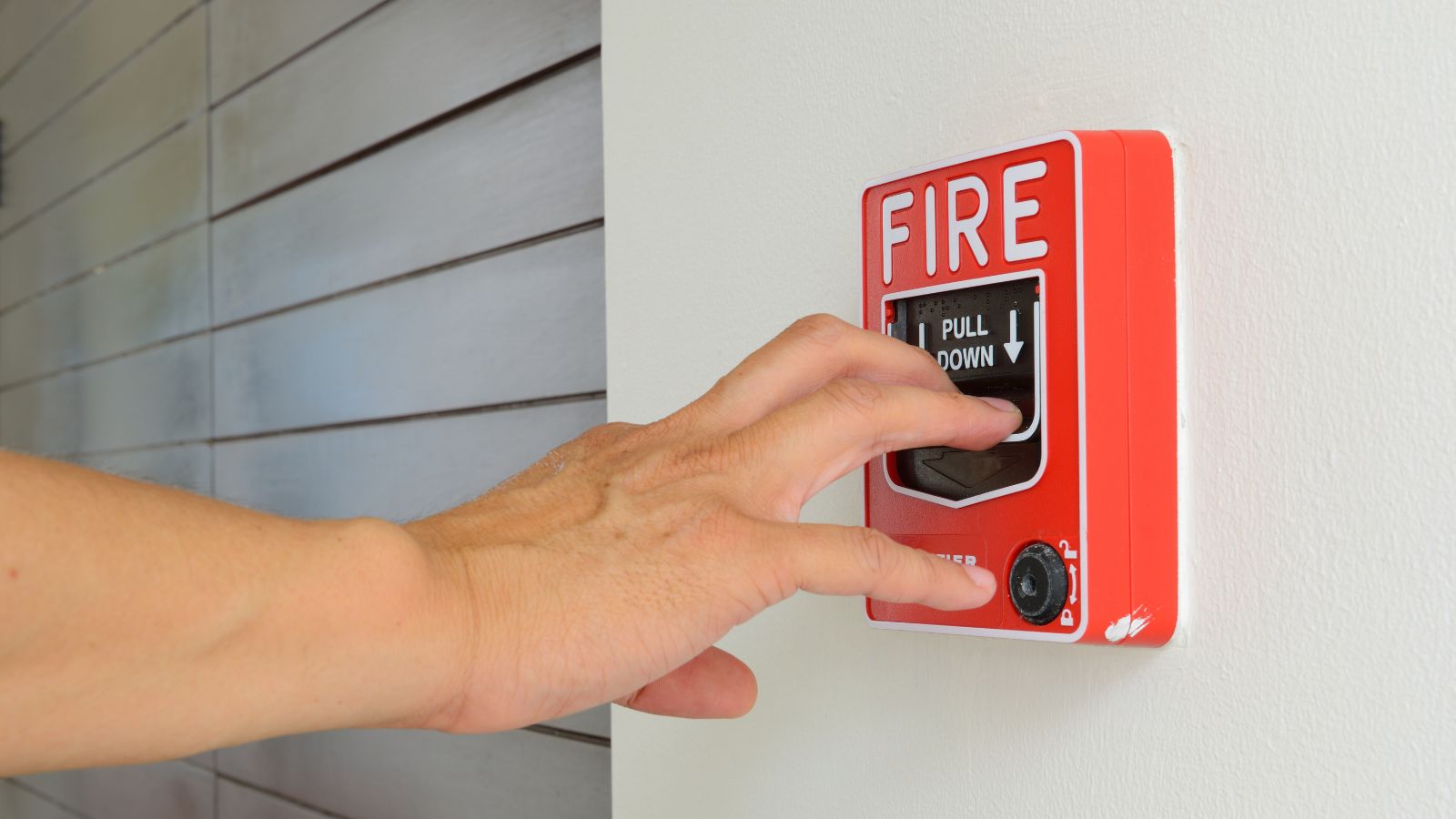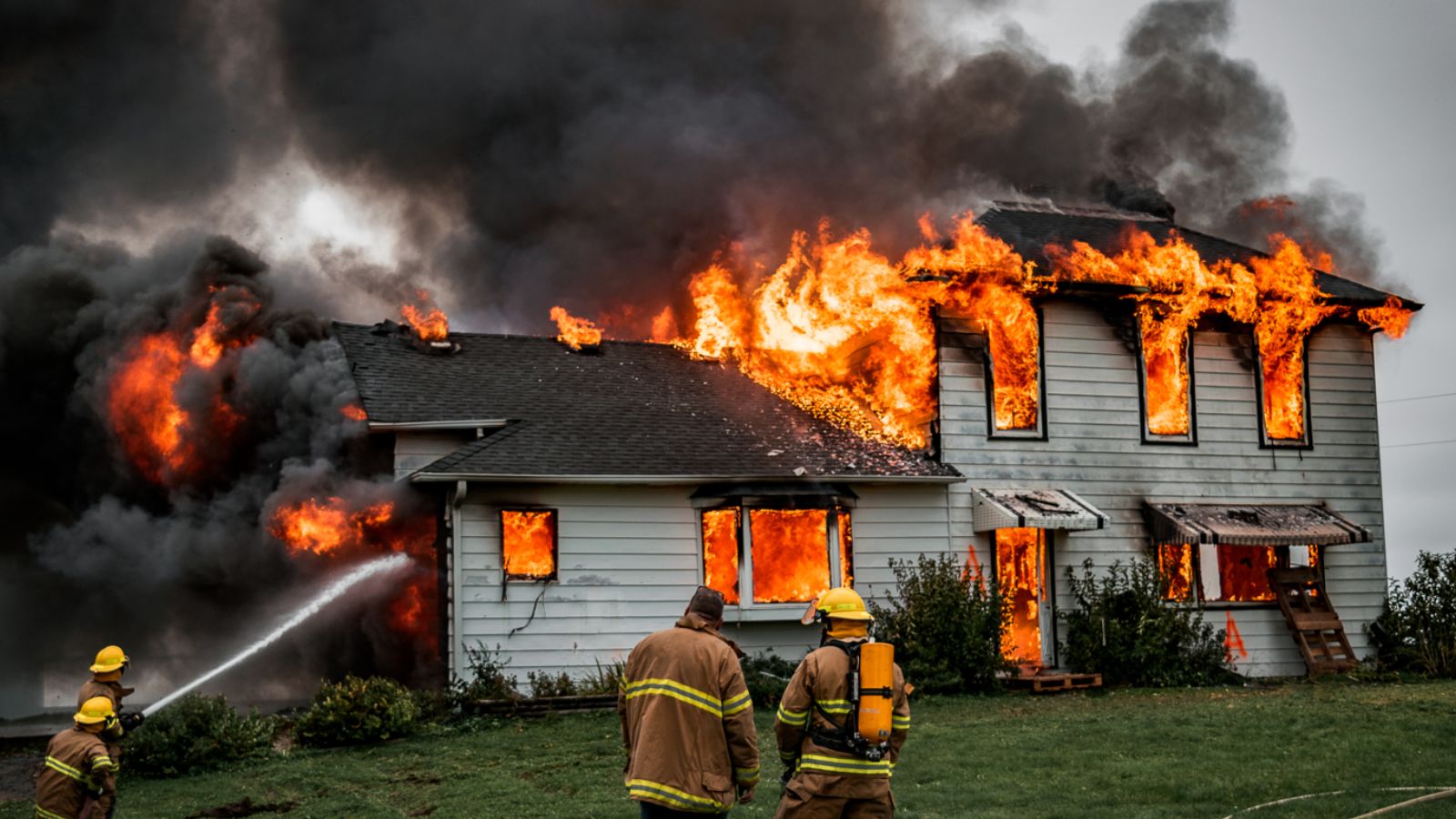For most of us, being in a burning building or trapped by a wildfire are terrifying emergencies we hope never to experience. Still, it’s crucial to know when our natural instincts urge us to do things that could put ourselves and others at risk. Here, we focus on 18 things you should avoid in the event of a fire to minimize your risk of injury or even death.
Hesitate to Evacuate

Every second counts in a fire, so get out as quickly as you can, and don’t be complacent or get distracted. If the fire alarm sounds or you see smoke or flames, warn or wake others while evacuating the building immediately. The Age reports that, in 2003, a 37-year-old Australian woman was found dead in her home next to the overnight bags she’d packed during a wildfire.
Re-enter a Burning Building

While it can be tempting to try to save pets or material possessions still inside, once you’ve safely evacuated, stay out! Re-entering a burning building puts you in extreme danger from flames, toxic smoke inhalation, and collapsing structures. As trained professionals equipped with protective gear and breathing apparatus, firefighters are the only ones who should enter.
Use an Elevator

Elevators often malfunction during a fire and can trap you inside with no way to escape as the shaft quickly fills with smoke. Their movement also acts as a ‘billow,’ circulating air around a building and helping the fire to spread. Always use the stairs during an evacuation and feel the doorknob before opening doors; a hot handle indicates fire on the other side.
Hide

Hiding is a natural response to a physical threat, but it’s a dangerous instinct to follow in a fire. Fire isn’t a human adversary; its flames and toxic smoke will ‘find’ you no matter where you hide. Plus, firefighters won’t be able to rescue you if you’re hidden. Instead, evacuate as quickly and directly as possible. If trapped, signal from a window and plug any door gaps with a wet cloth.
Gather Belongings

In a fire, material possessions are not worth risking your life for. The most precious family heirloom is you, and you won’t be able to benefit from any valuables if you’re dead. So, grab your family and pets and get out immediately. Everything else can be replaced one way or the other—living things are the most precious valuables in your home, so nothing else matters.
Open Windows or Doors

According to Fireline, opening windows and doors can introduce drafts of fresh air, fanning the flames and accelerating the spread of the fire, especially on lower floors. Only open doors if necessary to escape, and close them behind you to help contain the fire and smoke. If you must open a window to escape, break the glass, remove any shards, and climb out carefully.
Panic

While fear is a natural response to fire, panicking can cloud your judgment and stop you from acting in the most sensible and life-saving way. Try to remember any fire safety training or procedures and follow them if possible. Focus on getting yourself and others out safely and try to encourage others to be calm and rational; running around erratically will help no one!
Try to Be a Hero

It may be tempting to try and rescue others by taking risks, but you may make the situation worse for everyone. Unless you’re confident you can quickly and safely help others, leave firefighting to the professionals who are trained and equipped to handle dangerous situations. Don’t attempt to extinguish large flames or enter rooms full of smoke or fire.
Inhale Smoke

While it may be unavoidable to some extent, don’t neglect the seriousness of smoke inhalation or focus exclusively on the flames. A study published by the NIH states that 50% of fire victims have lethal levels of carboxyhemoglobin, 90% have soot in their lungs, and only 30% have burns or other injuries. Stay as low as possible, and cover your nose and mouth with a damp cloth.
Crowd Around Exits

During an evacuation, avoid congregating around doorways or exits. Encourage those ahead to exit the building as quickly as possible, but don’t shove or push. This can cause people to fall over and create bottlenecks, slowing down the evacuation process. Move swiftly and orderly toward the designated exits according to your building’s evacuation plan.
Block Evacuation Routes

Hallways and stairwells need to be clear for safe and efficient evacuation during a fire, so don’t block such places with furniture or belongings as you leave, especially if you aren’t sure whether others are still trapped behind you. Imagine trying to escape a fire in low light and finding someone who has thoughtlessly left their bicycle or luggage in the hallway!
Disable Smoke Detectors

Even if the fire is small and you’re sure you can handle it, never disable or tamper with smoke detectors. Even if you do get the fire under control, disabling any early life-saving warning system is foolish. A functioning smoke detector will save your life at a later date, plus the fire may have spread without your notice, or smoke levels may remain dangerously high.
Jump from High Floors

Jumping from a high floor is a very dangerous last resort. It should only be attempted if the threat of fire or smoke inhalation is extreme. If you’re trapped on a higher floor, wait by the window and signal for help from firefighters, who may be able to evacuate you safely. If you’re forced to jump, choose the shortest possible distance and throw bedding or mattresses out first to cushion your landing.
Try to Fight the Fire Yourself

City Fire warns that fighting any dangerous fire yourself is extremely risky. While a small, contained fire might be manageable with an appropriate fire extinguisher, sizable blazes should always be left to trained firefighters. Fire is unpredictable and spreads rapidly, so focus on evacuating yourself and others safely and let the professionals tackle the blaze.
Ignore Fire Alarms

Fire alarms are designed to warn you of danger and ignoring them is dangerously foolhardy. Even if you can see no sign of smoke or fire, exit the building according to the fire evacuation plan and stay outside in a designated fire evacuation point until the fire service arrives. If you believe the alarm was a drill or mistake, wait for official confirmation before returning inside.
Drink Alcohol

Even if you do have time for a quick swig of liquor to calm your nerves or to take a sedative, an emergency is neither the time nor the place for slow reactions or poor decisions. You need to stay alert and focused in order to escape safely, so don’t underestimate the risk. Never indulge in any type of mind-altering chemical if threatened by fire.
Carry Flammable Items

Hopefully, this is obvious, but never evacuate while carrying anything flammable or explosive, like fireworks, lighter fluid, aerosols, paraffin, cleaning supplies, or gas cans. These items can literally become bombs in the presence of extreme heat or flames, so evacuate as quickly as you can without carrying any objects—leave your hands free to escape and help others.
Walk Upright

Smoke inhalation is a leading cause of death in fires, and smoke rises to the highest point, so it is most potent at ceiling height on the top floor of a building. Stay as low to the ground as possible, where the air is clearer. Crawl on your hands and knees to avoid smoke inhalation as much as possible, and never walk upright through a room full of smoke.
Read More: 18 Misunderstood Acts The Bible Says Aren’t Actually Sins

People tend to assume that the Bible condemns a wide array of behaviors, but the reality might surprise you. Here, we zoom in on 18 so-called “sins” that may not be as bad as we thought.
18 Misunderstood Acts The Bible Says Aren’t Actually Sins
The Boomers Called It: 19 Stupid Trends That Backfired

Sometimes, we get carried away with trends that we think are cool at the time, only to realize later how utterly ridiculous they were. Join us as we take a cringe-worthy trip down memory lane and explore 19 stupid trends that backfired. Prepare for some facepalms!
The Boomers Called It: 19 Stupid Trends That Backfired
18 Reasons Why No One Is Interested in Working Anymore

The concept of traditional employment has taken a back seat in recent times with changes in economic and social factors, as well as individual preferences. Traditional jobs have also evolved, and many people don’t feel the need to take this route anymore. These are 18 reasons why no one is interested in working anymore.
18 Reasons Why No One Is Interested in Working Anymore
21 Things That Will Be Lost Forever When The Boomer Generation is Gone

Baby boomers grew up in a vastly different culture, so they have what younger generations consider strange habits. An internet survey recently asked, “What will die with boomers?” Here are the top 22 answers.
21 Things That Will Be Lost Forever When The Boomer Generation is Gone
18 Common Phrases That Signals Support for Trump

Understanding the unique language of politics, particularly among Trump supporters, can provide valuable insights into the nation’s current state. Here’s a deeper look into 17 phrases you’ll likely only hear from this demographic.

